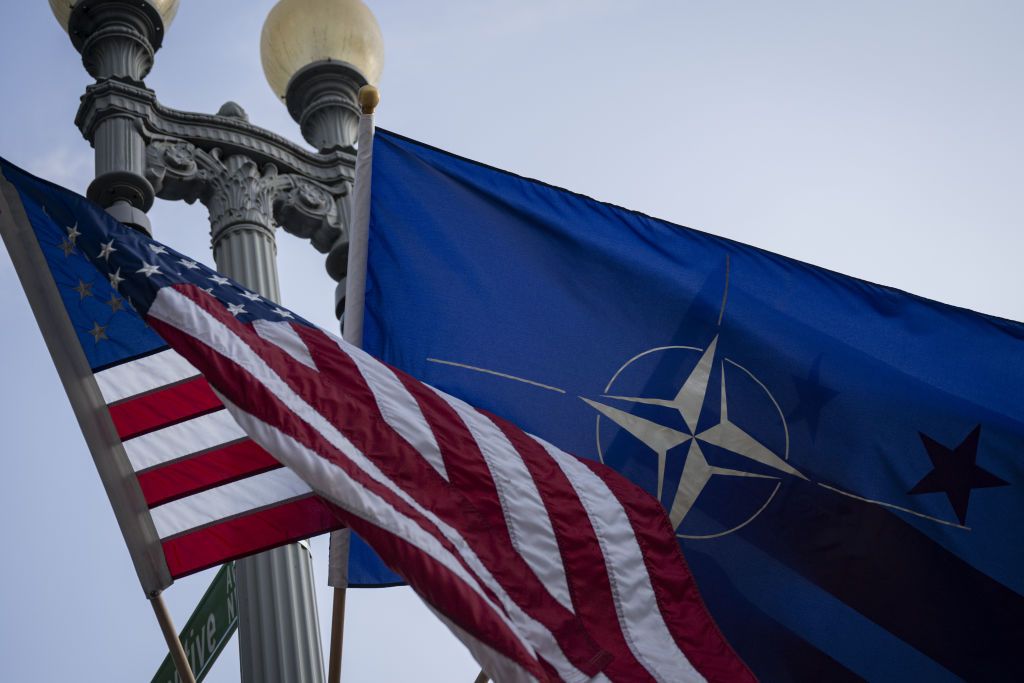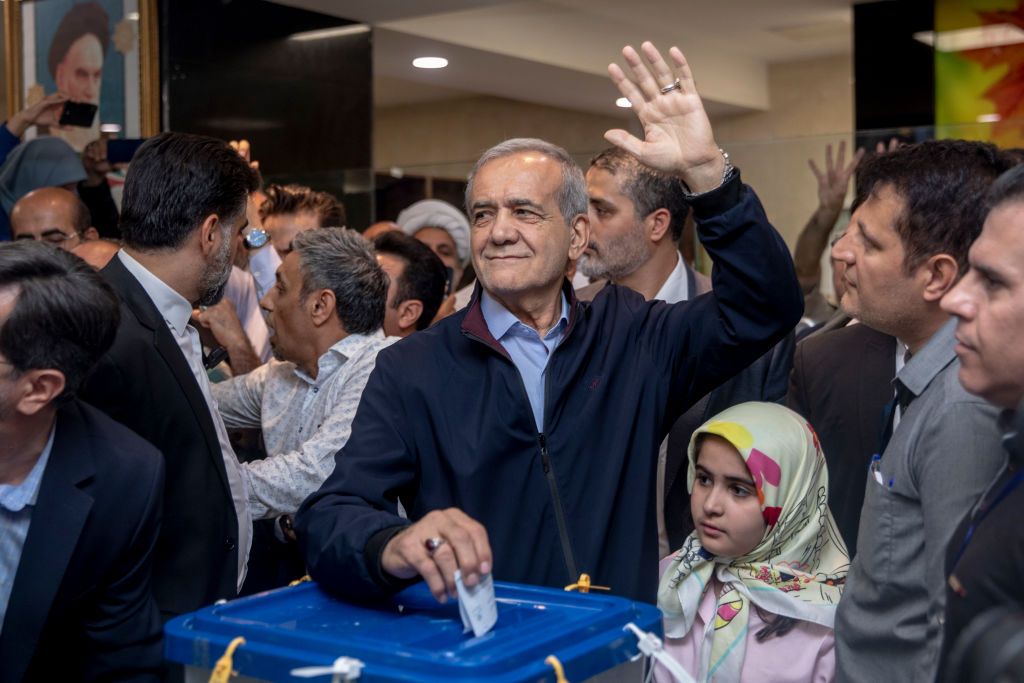Opinion: If not membership, NATO should offer Ukraine security guarantees

U.S. President Joe Biden (R) places his hand on NATO Secretary-General Jens Stoltenberg's (L) shoulder after giving him the Presidential Medal of Freedom amid NATO's 75th anniversary summit in Washington, D.C., U.S., on July 9, 2024. (Saul Loeb/AFP via Getty Images)

Mark Temnycky
Non-resident fellow at the Atlantic Council’s Eurasia Center
As foreign leaders and delegates gathered in Washington for the 2024 NATO Summit this week, Ukraine learned that it will not receive a formal membership invitation. This decision comes as a significant blow to Ukraine.
During the three-day gathering, critics of Ukraine’s potential NATO accession reiterated familiar concerns. They argued that Ukraine must address corruption issues and modernize its military before qualifying for membership. Critics also warned that NATO membership could escalate tensions with Russia. Ahead of the Washington summit, dozens of foreign policy experts emphasized these points in an open letter to NATO leaders.
However, such reluctance overlooks Ukraine’s ongoing progress. When Ukraine’s EuroMaidan Revolution began in 2013, then-Ukrainian President Viktor Yanukovych reneged his promise to sign an Association Agreement with the European Union, opting instead to maintain strong relations with Russia. Yanukovych had imprisoned a political rival, and corruption was very apparent in his government. For example, Transparency International’s Corruption Perception Index at the time ranked Ukraine 144 out of 175 places.
Following Yanukovych's impeachment in 2014, Ukrainian citizens elected a pro-Western government, demanding stronger ties with Western organizations and institutions. The Ukrainian government signed an Association Agreement with the European Union, where it agreed to “pursue economic, judicial, and financial reforms.” The Ukrainian parliament even rewrote Ukraine’s constitution, stating that the country had committed itself to integrating with the West.
Since then, Ukrainian society has transformed, and these efforts have not gone unnoticed. According to Transparency International’s 2023 Corruption Perception Index, Ukraine now ranks 104 out of 180 places.
Over the past decade, Ukrainian officials have worked hard to reform their government, closely interacting with representatives from the United States and the European Union. Ukraine was rewarded for its work in June 2017 when it was presented with visa-free travel to the EU. Ukraine was then granted EU candidate status in June 2022. Finally, EU accession negotiations officially began in June 2024. Kyiv still has work to do, but this progress suggests Ukraine is serious about its anti-corruption efforts.
Ukraine has also worked to modernize its military. Following the initial Russian invasion in 2014, Ukrainian participation in NATO exercises increased. Ukraine’s involvement in these events “contributed to Ukraine’s continued defense modernization.” Kyiv implemented various defense reforms, and this paved the way for Ukraine to be named an Enhanced Opportunities Partner in 2020.
Then, at the 2023 NATO Summit, the NATO-Ukraine Council was established to advance political dialogue, cooperation, and support Ukraine's membership aspirations. Recently, NATO announced at the Washington summit that it will station a senior official in Kyiv to strengthen its relationship with Ukrainian authorities, highlighting the crucial NATO-Ukraine relationship and Ukraine's strides in defense modernization.

Finally, despite critics' concerns that Ukraine’s NATO accession could provoke Russia, Finland and Sweden faced no such issues when applying to join NATO. When Russia invaded Ukraine in February 2022, Finland and Sweden submitted their NATO membership applications, despite Russian warnings. Russia eventually withdrew many forces from its borders with Finland and Sweden, and relations did not escalate.
Nevertheless, some NATO members oppose Ukraine's NATO membership, citing the need to resolve international disputes first. Others fear granting Ukraine NATO membership could lead to war with Russia, causing devastation across Europe.
Despite the reasoning from these critics, Ukrainian officials are disappointed. Over the past two and a half years, many Ukrainians have questioned what more they can do to sway NATO's opinions. Throughout the ongoing Russian invasion, Ukrainian forces have demonstrated their proficiency with Western weaponry.
In 2022, they successfully defended their capital and pushed Russians out of central and northern Ukraine. By 2023, they had retaken over half of the Russian-occupied territories in southern and eastern Ukraine. Most recently, Ukrainian forces repelled a Russian incursion in Kharkiv Oblast and continue to make gains along the Black Sea.
If many NATO members remain unwilling to offer Ukraine formal membership during this summit, they should provide Ukraine with security guarantees in three critical areas:
First, lifting restrictions on targeting Russian military installations would increase Ukraine's chances of success. Russia has military bases, airfields, ammunition depots, and weapons factories supplying their forces and launching missiles into Ukraine. Allowing Ukraine to strike these targets would disrupt Russian operations and limit their military capabilities.
Second, NATO members should lift restrictions on providing defense equipment to Ukraine. Supplying weapons such as Tomahawk and Taurus missiles would enable Ukraine to more effectively target Russian military sites, including those deep within Russian territory, further disrupting their offensive.
Third, NATO should help Ukraine protect its airspace. Providing advanced air defense capabilities would allow Ukraine to defend against Russian missile strikes, reducing damage to cities and villages and saving many lives.
Overall, Ukraine has diligently reformed its government and modernized its military while defending against Russia. Their efforts demonstrate a commitment to Western integration and security. NATO must now decide whether to deepen its relationship with Ukraine. Providing security assurances, in lieu of immediate membership, would strengthen Ukraine's defense against Russian aggression and prevent prolonged conflict and devastation in Europe.
Supporting Ukraine now is crucial to prevent a more deadly and devastating war.
Editor’s Note: The opinions expressed in the op-ed section are those of the authors and do not purport to reflect the views of the Kyiv Independent.











